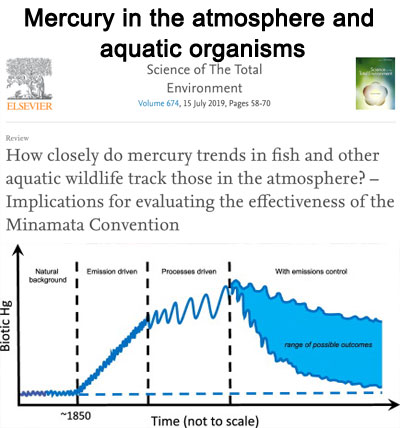
- Baumann, H. (2019)
Experimental assessments of marine species sensitivities to ocean acidification and its co-stressors: how far have we come?
Canadian Journal of Zoology 97:399-408

Experimental assessments of marine species sensitivities to ocean acidification and its co-stressors: how far have we come?
Canadian Journal of Zoology 97:399-408

How closely do mercury trends in fish and other aquatic wildlife track those in the atmosphere? – Implications for evaluating the effectiveness of the Minamata Convention
Science of The Total Environment 674:58-70
Graduate students Sean Ryan and Halle Berger received Honourable Mention awards (top 10 graduate student presentations) for their presentations at the 2019 Benthic Ecology Meeting in St. John’s Newfoundland. Halle Berger, co-advised by Profs. Samantha Siedlecki and Catherine Matassa, was awarded for her interdisciplinary talk “Using regional oceanographic forecasts to assess the vulnerability of the Dungeness crab to climate change stressors.” Sean Ryan (advisor Catherine Matassa) was awarded for his poster “Induced herbivore resistance varies with latitude in the rockweed Fucus vesiculosus.” Sean and Halle were among ~180 student presenters at the meeting. Congratulations on your accomplishments, Halle and Sean!
The Lund lab recently published a paper in Earth and Planetary Science Letters on hydrothermal scavenging of trace metals at the East Pacific Rise. The results suggest that 230Th, a radionuclide commonly used to constrain sediment accumulation rates on the seafloor, is highly sensitive to changes in hydrothermal output, with important implications for the use of 230Th in paleoclimate and geochemical studies (https://davidlund.wixsite.com/averypointpaleo/page4).
21 March 2019. Marine Environmental Research just published a study about long-term ecological change in eastern Long Island Sound based on data collected by Project Oceanology! This non-profit ocean literacy organization has educated middle and high school students on boat trips to nearby estuarine sites for decades. For the first time, the digitization of these data allowed their quantitative evaluation, offering insights into the abiotic and biotic changes in nearshore waters of Eastern Long Island Sound.
Mentored by Professor Hans Dam and Ph.D. student Matthew Sasaki, Undergraduate students Sydney Hedberg and Kailin Richardson (participants in the UConn-Mystic Aquarium Research-Experience-for-Undergraduates Program, carried out experiments that yield important insights into how zooplankton respond to warming. The results of the work are now published in the journal Royal Society Open Science (https://royalsocietypublishing.org/doi/10.1098/rsos.182115). The research shows that predicting the vulnerability of populations to global warming involves complex interactions between evolutionary adaptation, phenotypic plasticity, and sex (females rule !). The paper has two important implications. Surprisingly, tropical populations are more at risk because animals are already living near their thermal limits. In addition, because of the low survival of males, populations facing warming may be limited by the ability of males to fertilize females.
Photos by Hans Dam
More than 15 faculty members, graduate students, and undergraduates from the Department of Marine Sciences presented their research at last week’s ASLO (Association for the Sciences of Limnology and Oceanography) 2019 Aquatic Sciences Meeting in San Juan Puerto Rico. DMS presentations reflected the diversity of our faculty’s research disciplines and approaches, including coral reefs, plankton ecology and physiology, nitrogen cycling, microplastics, salt marshes, and ecosystem impacts of storm events.
Faculty, staff, students, and alumni of the Department of Marine Sciences participated in the 22nd annual Quahog Bowl held on UConn’s Avery Point campus. This year, sixteen high-school teams competed in the event which is a regional competition for the National Ocean Sciences Bowl. Members of the Department served as science judges, science graders, score keepers, and in other capacities at the annual event. The competition was fierce, and in the end the team from Science and Technology Magnet School A (New London, CT) won by besting the team from Coginchaug Regional High School (Durham, CT). Overall, all teams had a fun and educational day.
https://seagrant.uconn.edu/2019/01/24/16-teams-to-compete-in-22nd-annual-quahog-bowl-on-feb-2/
https://seagrant.uconn.edu/2019/02/05/nl-team-captures-first-quahog-bowl-win-heads-to-nationals/
From December 10-14, 2018, students and faculty from the Department of Marine Sciences attended the 2018 AGU Fall Meeting in Washington D.C. This conference covers space, atmosphere, ocean, and earth sciences, as well as special sessions focusing on science policy, communication, and education. This year marked the start of AGU’s centennial, which introduced more unique programs. It is also one of the largest natural sciences conferences in the world, with an average attendance of 25,000 people.
The department’s presentations covered sea sprary chemistry, the Ocean Observatories Initiative, mercury in the Bering Sea, nutrient budgets in Long Island Sound, and more.
28 November 2018. Hannes, Emma, and Chris are happy to announce that Biology Letters just published our latest study, a meta-analysis of 20 standard CO2 exposure experiments conducted on Atlantic silverside offspring between 2012-2017. All these years of sustained experimental work resulted in the most robustly constrained estimates of overall CO2 effect sizes for a marine organism to date.
The study demonstrated:
A general tolerance of Atlantic silverside early life stages to pCO2 levels of ~2,000 µatm
A significant overall CO2 induced reduction of embryo and overall survival by -9% and -13%, respectively
The seasonal change in early life CO2 sensitivity in this species
The value of serial experimentation to detect and robustly estimate CO2 effects in marine organisms
Baumann, H., Cross, E.L., and Murray, C.S. Robust quantification of fish early life CO2 sensitivities via serial experimentation. Biology Letters 14:20180408